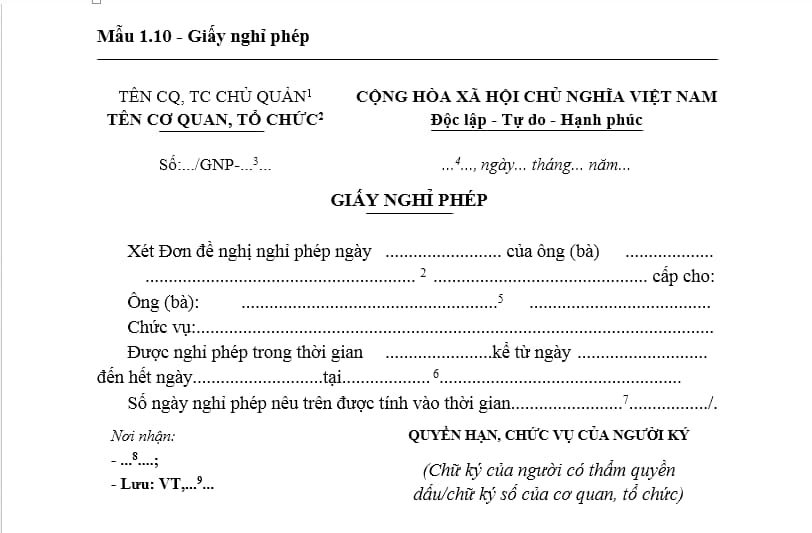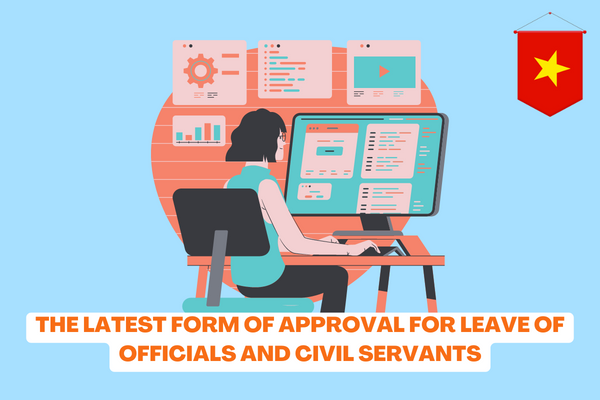Vietnam: What is the latest form of approval for leave of officials and civil servants currently?
- What is the latest form of approval for leave of officials and civil servants in Vietnam?
- Will officials and civil servants who take unexcused leave be subject to disciplinary reprimands in Vietnam?
- What are the principles of disciplinary action against cadres, civil servants and public employees in Vietnam?
What is the latest form of approval for leave of officials and civil servants in Vietnam?
The form of approval of the application for leave of cadres and civil servants in Vietnam is issued together with Decree 30/2020/ND-CP. Below is an image of the approval of the leave application forms of cadres and civil servants in Vietnam:

Download the latest form of approval for leave of cadres and civil servants in Vietnam: here.

Vietnam: What is the latest form of approval for leave of cadres and civil servants currently?
Will officials and civil servants who take unexcused leave be subject to disciplinary reprimands in Vietnam?
Pursuant to Article 8 of Decree 112/2020/ND-CP stipulating as follows:
Applying disciplinary reprimand to cadres and civil servants in Vietnam
The form of disciplinary reprimand shall be applied to cadres and civil servants in Vietnam who commit first-time violations with less serious consequences, except for violations specified in Clause 3, Article 9 of this Decree, in one of the following cases:
1. Violating regulations on ethics and communication culture of cadres and civil servants; provisions of law on the performance of duties and duties of cadres and civil servants; labor discipline; rules and regulations of agencies, organizations and units;
2. Taking advantage of a working position for profit purposes; have a bossy attitude or cause difficulties or troubles to agencies, organizations, units and individuals in the performance of official duties; certify or issue legal documents to ineligible persons;
3. Failing to comply with decisions on mobilization and assignment of competent authorities; failure to perform assigned duties without good reason; causing disunity in agencies, organizations and units;
4. Violating the provisions of law on: crime prevention and control; prevention and control of social evils; social order and safety; anti-corruption; saving practices, anti-waste;
5. Violating the provisions of law on protection of state secrets;
6. Violating the provisions of law on complaints and denunciations in Vietnam;
7. Violating regulations on democratic centralization, regulations on propaganda, speech, and regulations on internal political protection;
8. Violating the provisions of law on: investment and construction; land, environmental resources; finance, accounting, banking; management and use of public assets in the course of performing official duties;
9. Violating the provisions of law on: preventing and combating domestic violence; population, marriage and family; gender equality; social security; other provisions of law relating to cadres and civil servants.
Thus, according to the above provisions, there are no specific regulations on what form of disciplinary action will be applied in case cadres and civil servants in Vietnam leave their jobs without permission.
However, the above regulation refers to the violation of regulations and rules at the workplace for the first time, causing less serious consequences that will be disciplined in the form of reprimand.
Therefore, whether officers and civil servants who take unexcused leave will be subject to disciplinary reprimand or not, based on the rules and regulations at the agency or unit in which that person works and the consequences of unauthorized leave for disciplinary consideration.
What are the principles of disciplinary action against cadres, civil servants and public employees in Vietnam?
Pursuant to Article 2 of Decree 112/2020/ND-CP stipulating the principles of disciplinary action against cadres, civil servants and public employees as follows:
-. Objectivity, fairness; openness and transparency; strict, legal.
- Each violation is dealt with only once by a disciplinary action. At the same time of considering disciplinary action, if cadres, civil servants and public employees have 02 or more violations, they shall be disciplined for each violation and apply a disciplinary measure that is one level heavier than the disciplinary form applied to the most serious violation, except for cases of disciplinary action in the form of dismissal or dismissal; do not separate each violation content of cadres, civil servants and public employees to handle discipline many times with different forms of discipline.
- In case cadres, civil servants and public employees who are in the process of implementing disciplinary decisions continue to commit violations, the following disciplinary measures shall be applied:
+ If a violation is subject to disciplinary action in a form lighter or equal to the currently enforced disciplinary form, the disciplinary form is one level heavier than the currently enforced disciplinary form.
+ If an offence is subject to disciplinary action in a heavier form than the currently enforced disciplinary form, the disciplinary form is one level heavier than the disciplinary form applied to the new violation.
- When considering disciplinary action, it must be based on the content, nature, extent, harm, cause of violation, aggravating or mitigating circumstances, attitude of acquisition and correction, the correction of defects, violations, consequences caused.
- No administrative sanctions or party discipline shall be imposed in lieu of administrative discipline; administrative disciplinary action is not substituted for criminal prosecution, if the violation reaches the level of criminal punishment.
- In case cadres, civil servants and public employees have been disciplined by the party, the form of administrative discipline must be ensured at a level commensurate with party discipline.
Within 30 days from the date of publication of the party disciplinary decision, agencies, organizations and units must consider and decide on administrative discipline.
- All acts of violating the body, spirit, honor and dignity during disciplinary action are strictly prohibited.
- Cadres, civil servants and public employees who commit first-time violations that have been disciplined within 24 months from the effective date of the disciplinary decision with the same violations shall be considered repeat offenders; beyond the 24-month period of enforcement such violation is considered a first-time violation but counts as an aggravating circumstance when considering disciplinary action.
LawNet